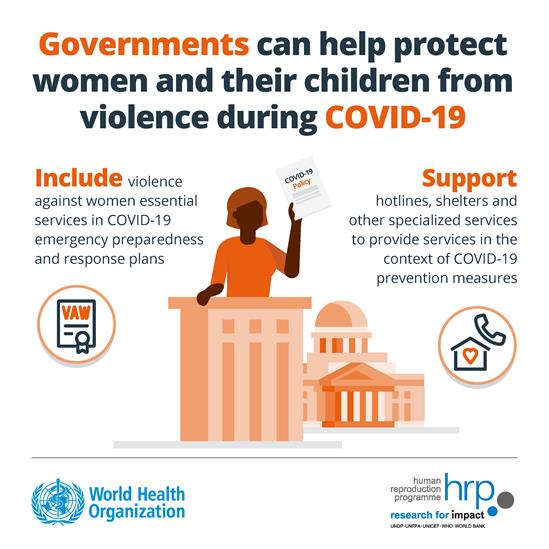Coronavirus disease (COVID-19) advice for the public: Advocacy
Addressing Human Rights as Key to the COVID-19 Response
This document brings to attention key health and human rights considerations with regards to COVID-19 pandemic. It highlights the importance of integrating a human rights based approach in response to COVID-19. It provides key considerations in relation to addressing stigma and discrimination, prevention of violence against women, support for vulnerable populations; quarantine and restrictive measures and shortages of supplies and equipment. It also highlights human rights obligations with regards to global cooperation to address COVID-19.
- Access the publicationParenting in the time of COVID-19
School closures, working remote, physical distancing — it's a lot to navigate for anyone, but especially for parents. To help parents interact constructively with their children during this time of confinement, WHO teamed up with the Parenting for Lifelong Health initiative to bring parents and caregivers a set of handy tips.
Posters
Social media squares
COVID-19 and violence against women
This document brings attention to the different ways in which the COVID-19 pandemic and measures to address it, such as staying at home, may exacerbate the risk of domestic violence against women. It highlights the importance of ensuring that support and medical care services for women and children affected by such violence are maintained and what health providers/services can do, including through identifying and offering referral options. It provides recommendations on what measures governments, health providers, community members and others can take to mitigate such violence and its impacts. It also provides tips for coping with stress at home and actions women who are experiencing violence or their family members can take.
Gender and COVID-19
This Gender and COVID-19 advocacy brief calls on WHO Member States and all global actors to take into consideration gender in COVID-19 preparedness and response. It highlights the importance of gender analysis and gender-responsive public health policies and measures to curb the epidemic. Taking account of how gender interacts with other areas of inequality, the brief provides key considerations in relation to disaggregated data, violence against women and children, sexual and reproductive health and rights, the health and social workforce, health equity and vulnerable groups, and stigma and discrimination.
- Access the publication (uploaded on 14 May 2020)
Addressing violence against children, women and older people during the covid-19 pandemic: Key actions
Several countries affected by COVID-19, have seen increases in levels of violence occurring in the home, including violence against children, intimate partner violence and violence against older people. Countries also face increasing challenges in maintaining support and care for survivors of violence. This brief compiles key actions that the health sector can undertake within a multisectoral response to prevent or mitigate interpersonal violence based on existing WHO guidance.
- Access the publication (uploaded on 18 June 2020)











